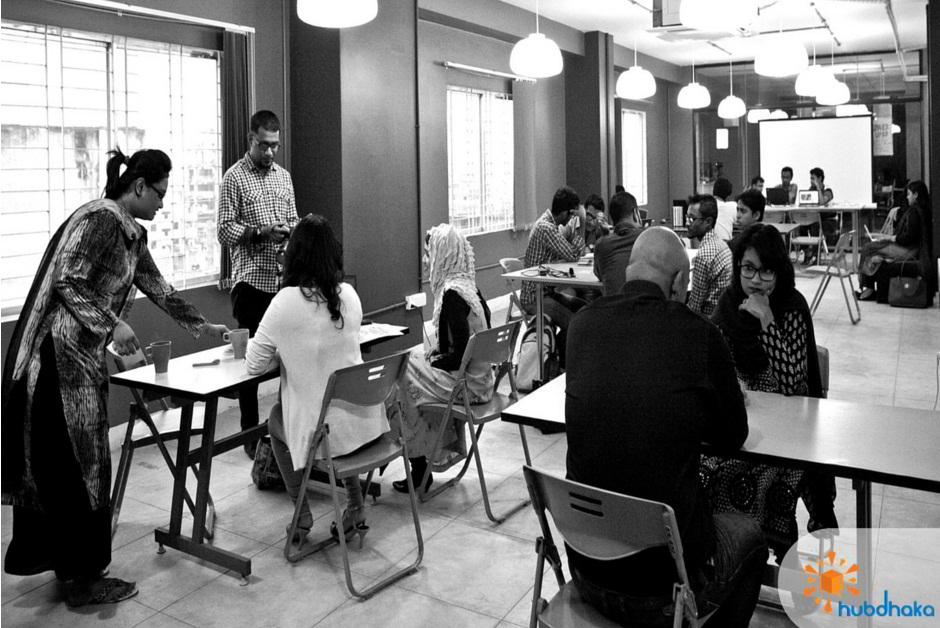
Once you get the idea, it is impossible to make it happen unless you put in loads of sweats and hard works. Hubdhaka is no different. “I announced the starting of a coworking space in November 2013, said Sajid, but it was only a tiny part of the game”. He was yet to know many things. Decisions about location, space, and investment were not made. “I knew even before starting hubdhaka that many people did not start a coworking space because it is such a capital intensive business,” said Sajid, a very logical explanation of why we did not have a coworking space yet, and “it is an investment for long haul but I wanted to solve a real problem and create a space where people can come and make things happen.”
[su_note note_color="#f9fafd" text_color="#4e8df6" radius="4"]As part of our exploration to understand big and game changing ideas we spoke to hubdhaka founder Sajid Islam, team hubdhaka, and visited the place, to learn more about hubdhaka as a coworking space. This four part series is our attempt to look into hubdhaka as a coworking space and explore what hubdhaka aspires to become in the coming days. Read part one here.[/su_note]
The journey of hubdhaka started with finding a right location. It was a difficult decision for Sajid. Dhaka is such a busy city. It is almost impossible to find a location where people can find open space, enjoy few peaceful moments and all. Sajid considered few places at first like Dhanmondi, Gulshan and Uttara but decided otherwise. Location was an important decision because it had lots of impact on the future of the space itself. Sajid had to find a space which is convenient for the people to go, not so crowded, and gives a feeling of home. After much thought, Sajid decided to settle down in Mirpur.
It was because Mirpur is largely a residential area; it has all modern facilities, and has large empty spaces, and traffic is comparatively good than many other parts of the city. Unlike many other parts of the Dhaka the roads are spacious in Mirpur, buildings are better planned, and although a large number of people lives here it is less crowded. It is a best location for building a community. Therefore, we decided to build a space in Mirpur. We wanted a commercial space close to main road, so we negotiated the rent and got a very good deal. We had to take the 9th floor and it was not ready made, but it was advantageous on a cost-benefit analysis.~Sajid Islam
Finding location and launching the construction of the building were just two dots of the whole combination. There was more to it.
Designing a coworking space is meticulous job. A coworking space is more than a space. It needs to be designed well, designed in a way that inspires interaction, promotes actions, and makes people feel good so that they can accomplish more.
“I did not realize what I was getting into until we sealed the deal, and we now had our space, but it had unfinished floors, no electrical lines, or walls. We made a lot of mistakes, and took baby steps. We wanted to be women-friendly, and wanted to make a separate washroom for females.”
Hub Dhaka was bootstrapped from the day one. Sajid had to put money from his own pocket to build the space and make it operative. In the beginning there were a lot of question marks. Trying to find an investor was extremely difficult for the team. So Sajid decided to bootstrap it.
“The idea was simple. Initially I put my own funds, and we intended to create a stable framework with passion and dedication, and then later raise funds for future expansion. That is the approach we are taking now.”
Designing a coworking space is meticulous job. A coworking space is more than a space. It needs to be designed well, designed in a way that inspires interaction, promotes actions, and makes people feel good so that they can accomplish more.
Once the space was ready Sajid started to organize events to create awareness about coworking space in Dhaka. It was an extremely difficult job. For first three months the space had no member. They hosted events and tried to educate people on coworking space, on a one to one basis, and eventually people started coming. But journey to that was a real hard one.
“We did the first event and we could only buy 2 ACs at that time. We brought standing fans, used ice blocks in buckets to cool down the room in the extreme heat, and worked for about 54 hours, and spent BDT 3000.”
[blockquote source]After initial struggle today hubdhaka is one of the fastest growing startups in Dhaka. It seems they have cracked the business model, made the space a lot better in less than one year time, adding new features every now and then, and growing like crazy.[/blockquote]
Today hubdhaka is adding members almost every day and serving a group of entrepreneurs, startups, freelancers, and independent professionals who love the space. In addition to the space, it offers wi-fi with 3 Internet providers at any given time, has generator back up for blackout. The whole space is air-conditioned.
Hubdhaka provides refreshments, facilitates engagement among members. It has interns helping those who come to work. It also offers a dedicated meeting room to members and provides projectors, plasma TV, and sound system for events.
“We are working hard to make it a professional working space without the expensive overhead costs.”
After initial struggle today hubdhaka is one of the fastest growing startups in Dhaka. It seems they have cracked the business model, made the space a lot better in less than one year time, adding new features every now and then, and growing like crazy.
In following episode we will explore growth, challenges, and people of hubdhaka.
